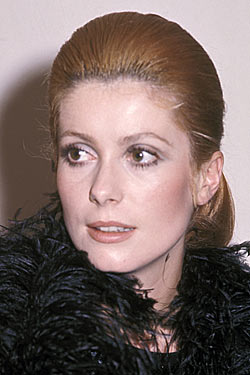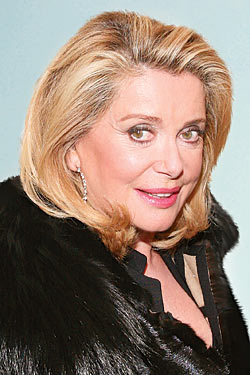
Sitting stiffly in the lobby of the Mercer hotel, Catherine Deneuve isn’t given to the usual fake intimacies or actressy effusions. She offers no canned anecdotes about her 54-year career or her latest U.S. release, François Ozon’s comedy Potiche. In light of her 100-plus movies (in a few hours, she will introduce Repulsion at the start of a 25-film retrospective at the Brooklyn Academy of Music) and her status as France’s most venerated living actress, she could be forgiven for behaving like royalty—but she has fewer airs than the average soap-opera diva. On one level, this is wonderfully refreshing. On another, she’s so guarded, so painfully unexpansive, that she’s almost passive-aggressive. “She’s the original bottom as top†is how a friend puts it: a woman who submits in order to control.
Yet I come away liking her. I mean, she’s Catherine Deneuve—one is lucky to breathe the same air. More than that, those defenses are central to her screen persona. In some essential way, she has triumphed without ever being a natural actress.
One thing leaps out when scanning the list of Deneuve’s films. Unlike many American stars, who choose the vehicle rather than the director, she has made a point of working with many of the great European filmmakers of the past century: Jacques Demy (four films), Roman Polanski (two), Luis Buñuel (two), Agnès Varda (two), François Truffaut (two), Manoel de Oliveira (three), Raoul Ruiz (two), André Téchiné (six), Lars von Trier (one), Arnaud Desplechin (two), and Ozon (two).
Sometimes directors sought out Deneuve, the inhumanly beautiful blonde, the icon to be worshipped and, on occasion, defiled. Sometimes she sought them out. “I like to be directed, to be someone else’s instrument,†she says, sipping her Diet Coke (no ice), still lovely at 67 although clearly, as they say, “worked on.†“I like someone who knows what he wants from me and where he wants to take me.â€
It was her older sister, Françoise Dorléac, who was the natural, expansive one—and whose death in a car accident in 1967, after completing Demy’s The Young Girls of Rochefort, left the devastated Deneuve to carry on the family tradition. (Their father, Maurice Dorléac, was a stage and screen actor.)
In the beginning she was used: by Demy in The Umbrellas of Cherbourg for her porcelain radiance, Polanski for her “Don’t touch!†vibe, and Buñuel for her iciness. Deneuve has written that she felt cruelly handled by Buñuel as the frigid Paris housewife turned prostitute in Belle de Jour, her most overrated film. (Critic Manny Farber dubbed her “Catherine Deadnerve.â€) “I suppose [Buñuel] wanted someone who would not show more of a personality on the face,†she tells me, adding, “I’m not so sure he liked that much actors. He needed them, but he thought they could be a fuss. The shooting was not the thing he preferred.†She worked with him again, though, on his home turf in Spain in the more bracing Tristana. Deneuve was a decade too old for the role of naïf taken to bed by her adopted father (Fernando Rey), but she was coldly brilliant in the later scenes, when the character took (passive-aggressive) revenge on the now bedridden older man.
In her memoir of various film sets, The Private Diaries of Catherine Deneuve, she reveals a lively mind, observant and intuitive. But she’s not, she admits, a talker, especially in English, which she has never fully mastered. One word that makes Deneuve flinch (not just with me—I’ve seen it in other interviews) is “relationship,†even when meant innocently, as in, “What was your relationship with Buñuel?†There’s that fear we mean romantic relationship, like the one she had with Roger Vadim, who took up with her while she was a teenager, induced her to go blonde, and fathered her son; or with Truffaut, who reportedly had a breakdown when she left him; or with Marcello ÂMastroianni, with whom she had her daughter, ÂChiara.
Deneuve grew as an actress when she neared 40, in Truffaut’s The Last Metro, opposite Gérard Depardieu, and in the films she’s done for Téchiné, who she says pushes her hard, sometimes doing 30 or 40 takes: “He always wants more. He wants to get you out of your own past.†She is astonishingly good in Téchiné’s My Favorite Season as the sister of Daniel Auteuil (a frequent co-star) watching their elderly mother die—one of the first times you can see on her face the struggle to remain upright, to remain … Catherine Deneuve.
Deneuve’s reserve dissolves into delight when she is discussing her upcoming musical Les Bien-Aimés, in which she gets to sing with Chiara (a wonderful vocalist). As for Potiche, in which she plays the trophy wife of a philandering umbrella manufacturer (a coincidence, not an homage to the film that made her a star), she sashays, mugs, and seizes the screen by force of personality. Comedy was fun: “You speak louder, you go faster. You need to be physically in good shape, because it demands a lot of energy, but it also gives energy.â€

But the movie is camp, and Deneuve will never be: She doesn’t have the right transgressive exuberance, the joy in travestying the kind of traditional feminine behavior on which she’s built her career. She’s entertaining in that dog-walking-on-its-hind-legs way.
That night at BAM, she is terse but charming at a Q&A after Potiche, her umpteenth pairing with Gérard Depardieu. “He is very embarrassed by his physical appearance [Depardieu is big as a house these days], but at the same time he is very light.†When it’s time to introduce the seminal slasher movie Repulsion, she talks for less than two minutes. She says Polanski was “very precise†and that, as an accomplished actor himself, he gave her line readings and gestures and moved her around, and that she did what he wanted and it wasn’t as grueling as it looked and sometimes even cheerful.
A disappointingly scant presentation, but characteristic—and, in its way, likable. Deneuve won’t go back in time to relive the experience for an audience, the way a natural actress would. Her business is seducing by withholding, giving us her tantalizing image and little else. Wouldn’t anything more be a letdown?
